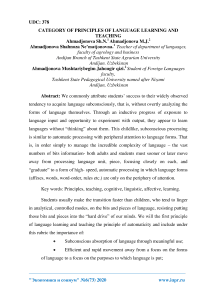Category of principles of language learning and teaching
Автор: Ahmadjonova Sh.N., Ahmadjonova M.J.
Журнал: Экономика и социум @ekonomika-socium
Рубрика: Основной раздел
Статья в выпуске: 6-1 (73), 2020 года.
Бесплатный доступ
We commonly attribute students’ success to their widely observed tendency to acquire language subconsciously, that is, without overtly analyzing the forms of language themselves. Through an inductive progress of exposure to language input and opportunity to experiment with output, they appear to learn languages without “thinking” about them. This childlike, subconscious processing is similar to automatic processing with peripheral attention to language forms. That is, in order simply to manage the incredible complexity of language - the vast numbers of bits information- both adults and students must sooner or later move away from processing language unit, piece, focusing closely on each, and “graduate” to a form of high- speed, automatic processing in which language forms (affixes, words, word-order, rules etc.) are only on the periphery of attention.
Principles, teaching, cognitive, linguistic, affective, learning
Короткий адрес: https://sciup.org/140252424
IDR: 140252424
Список литературы Category of principles of language learning and teaching
- Jack, C. Richards, Theodore S. Rodgers. 2001. Approaches and methods in language teaching. Cambridge University Press.
- Jahnson, K. and Morrow, K. 1989. Approaches. Cambridge University Press.
- Egamberdiyeva D.U. The essence of the method of video-english. Conference materials. 2016.
- Majidova Z.A. Innovative methods and approaches in learning and teaching foreign language in foreign methodology. Moscow. 2019.


